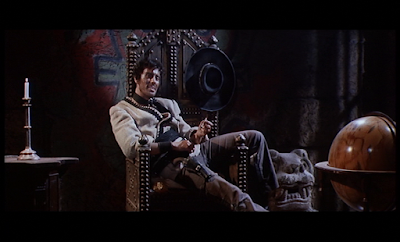Pecos è qui… prega e muori!
D: Maurizio Lucidi. P: Franco
Palombi, Gabriele Silvestri. W: Adriano Bolzoni, Augusto Caminito, Fernando Di
Leo. Ph: Franco Villa. M: Coriolano Gori. St: Robert Woods (Pecos Martinez), Luciana
Gilli (Dona Ramona), Erno Crisa (El Supremo), Pedro Sanchez (Dago), Umberto
Raho (Pinto)
In My Name is Pecos (1966), the title character strolled into view
like the object of Steve Buscemi’s awed recollection in Desperado – “The biggest Mexican I have ever seen.” Robert Woods’
swagger as the half-breed Pecos, complemented by Lucidi’s sinewy direction, made
for a satisfyingly raw revenge western. It was a modest hit in Italy, a much
bigger success in the Third World, where Woods became a bona fide icon in a
role that reversed genre stereotyping. Here was a Mexican character, so often
demonised or diminished in westerns, at the centre of the action, exacting
retribution for past and present wrongs.
Counterintuitively – or commendably, according to taste – the filmmakers dropped Pecos into a completely different context for the sequel, in which he helps a trio of mariachi players locate legendary Aztec treasure. Out goes the broiling intensity; in come whimsicality, sacred temples and secret passageways. Notionally he remains a champion of the oppressed. Early on he silences three bigoted gringos with bullets, and he signs up to the treasure hunt for the chance to bring down the tyrannical El Supremo, in whose misappropriated domain the riches – earmarked for the salvation of Mexico – are supposedly ensconced. (Not that this deters Pecos from laying claim to the riches himself once they have been unearthed.)
Counterintuitively – or commendably, according to taste – the filmmakers dropped Pecos into a completely different context for the sequel, in which he helps a trio of mariachi players locate legendary Aztec treasure. Out goes the broiling intensity; in come whimsicality, sacred temples and secret passageways. Notionally he remains a champion of the oppressed. Early on he silences three bigoted gringos with bullets, and he signs up to the treasure hunt for the chance to bring down the tyrannical El Supremo, in whose misappropriated domain the riches – earmarked for the salvation of Mexico – are supposedly ensconced. (Not that this deters Pecos from laying claim to the riches himself once they have been unearthed.)
It is a far more relaxed Pecos, however, who saunters through an inconsequential plot that melds the ripping yarns of H. Rider Haggard with a soupcon of the tortuous duplicity widespread in sub-Leone Euro-westerns. Woods is as compelling as ever but his character seems out of place here.
His antagonist, El Supremo, thinks he’s something special – a descendant of Montezuma, so he tells people, with delusions of overthrowing the government and ruling Mexico himself. Installed on a throne in his temple redoubt, he is a kinsman of several other deranged Euro-western despots – see ‘Caesar’ Fuller in Death Walks in Laredo (1966), the general in Charge! (1973) and Craig Hill in Run, Men! Eldorado is Coming to Trinity (1972). Where most roles in this vein were overplayed for comic effect (with the predictable consequence of lessening the comic effect), Crisa plays it straight, as if he’s not in on the joke. He is a distinctly prosaic villain – surely the opposite of what was intended.
The plot is better served by El Supremo’s lieutenants: the smooth Frenchman Tonville, a typically smarmy turn by Carlo Gaddi; El Rayo (Gino Barbacane), ‘lightning’, a fast-draw killer; Dago, the obligatory coarse, corpulent bandido, with Pedro Sanchez a serviceable stand-in for Fernando Sancho. Pecos has little trouble with these fellows. After dispensing with Dago, he insinuates himself into El Supremo’s outfit and erodes it from within. Exploiting the lust of Tonville for the captive Ramona, a local dignitary’s daughter, he lures him to a fateful rendezvous. (Pecos has the mariachis play Offenbach’s Infernal Galop during the confrontation – an amusingly discordant touch.) He then stokes greed and resentment in the bosom of El Rayo. The script sets up the latter and Pecos for a monumental showdown that Lucidi fills to deliver.
Lucidi’s laxity typifies the enterprise. Bolzoni (Kill and Pray, A Professional Gun) and Di Leo (Dollars one and two, The Return of Ringo), first-rate writers, lazily juggle the clichés of the adventure and western genres. The mild buffoonery of the mariachi men establishes the mood from the opening credits, over which they are seen to play Gori’s infectious theme tune. The production design – more suited in large part to a peplum than a western – and photography are nothing exceptional. The Euro-western had settled into its comfort zone by this stage and the attempt to make this one stand out from the pack would have been more successful had it been executed with greater energy and flair.







No comments:
Post a Comment